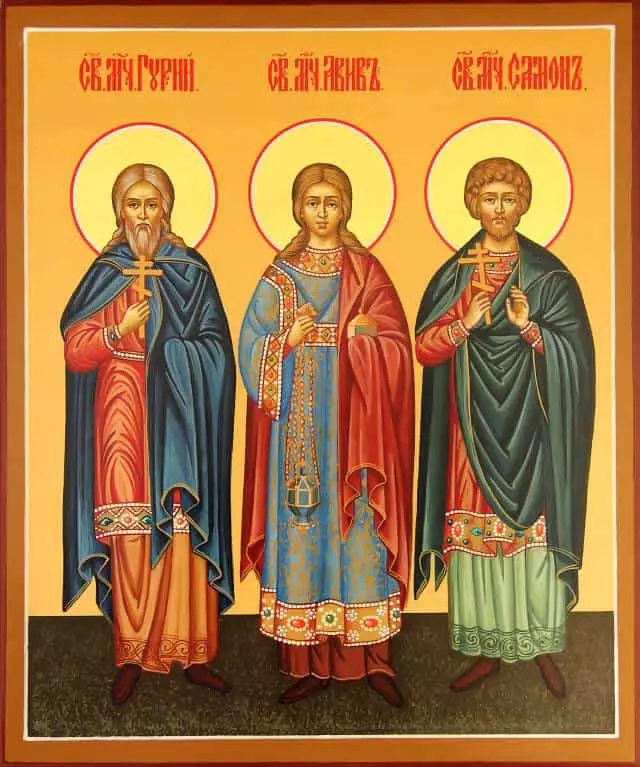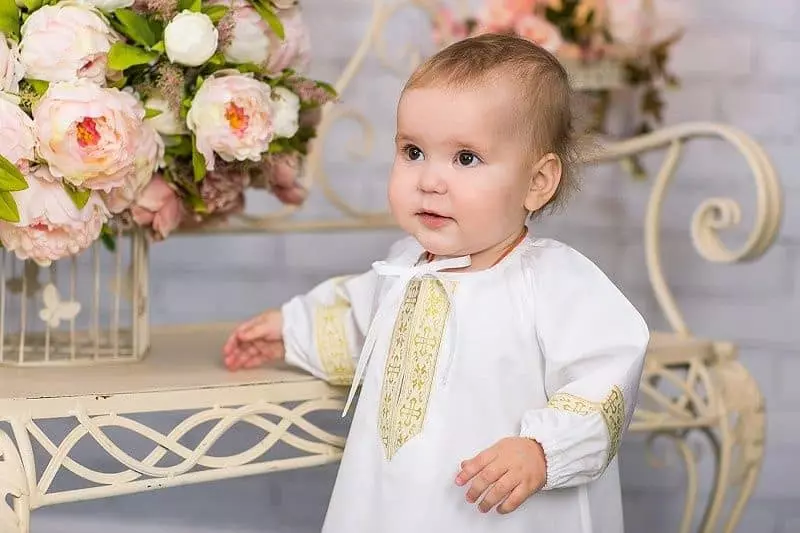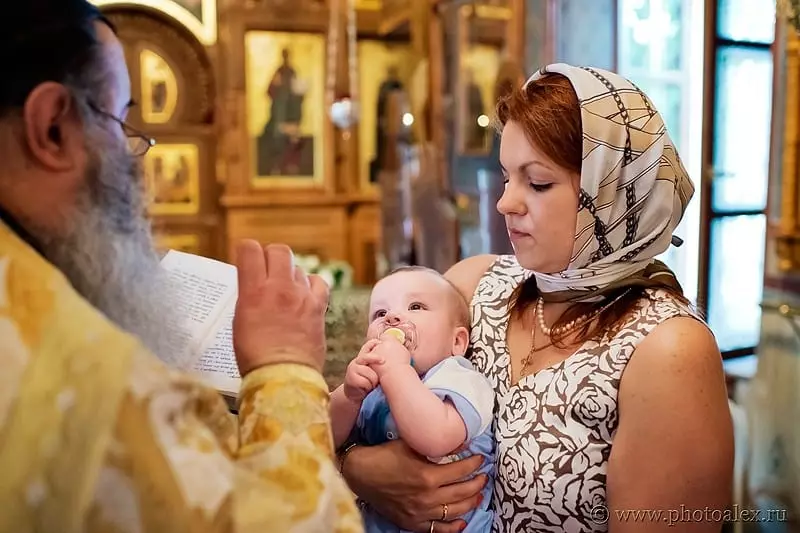In the Orthodox tradition, it is customary to call a child with the name of the saint, which is honored on the day of name (after a week). However, parents can give another name to their baby if the names specified in these numbers do not like them.
It is allowed to take the name of the saint, the reverence of which is carried out in the coming dates, or who we read in the family of this family. Orthodox names for boys are recorded in the salty. Before name, parents must familiarize themselves with the living of that saint whose name they decided to give their child.
Man all his life is associated with invisible threads with that heavenly patron, whose name he wears: Do not forget about it. My sister named Olga from youthful age felt that Princess Olga helps her, the wife of Prince Igor.

Church names
The tradition of giving newborn the names of the Christian saints arose after the III century of our era. Previously, children were called generally accepted names distributed in one area or another. These names, as a rule, indicated the occupation or some individual characteristics of a person. For example, the Italian name Roman denotes a person from Rome, and Victor is the winner.
Subsequently, the tradition has changed, and parents began to call their children with the names of Christian devotees to establish a close connection of the child with the Lord. The names that Christian devotees and martyrs were considered consecrated.
Many respectful Christians told that they felt an invisible connection with their holy patron, whose name was worn.
By numerous requests of readers, we have prepared an application "Orthodox calendar" for a smartphone. Every morning you will receive information about the current day: Holidays, posts, commemoration days, prayers, parables.
Download free: Orthodox calendar 2020 (Available on Android)
Nimorograms are different. Interestingly, all the well-known Russian names of Ivan and Marya are not really Russian and not even Slavic: they are biblical. Just the sound is Russified. In the biblical version it is John and Mariam.
The name Mikhail, who, too, are also used to, also biblical. So the tradition was developed that the children began to call biblical names to attract the mercy of heavenly patrons.
All Orthodox names are recorded in the sacraticles, and the list is constantly complemented and updated. Today, the list includes more than 1,000 different names, among whom many harmful and modern.

Church names for boys are:
- biblical;
- Greek;
- Egyptian;
- Scandinavian;
- Latin;
- Slavic.
In the nameslo shatters, even those nameslors, which have long been forgotten, and untouched men's names have been stored.
Where can I see church names for newborn boys? Every year, Moscow Patriarchate publishes the church calendar, which can be purchased in church kiosks.
Latin
- Augustine is one of the city of Augustus.
- Averky - removal; Holding.
- Adrian - from the city of Adria.
- Alpius is the one who will not be sad.
- Amvrosiy - Divine, Eternal, Immortal.
- Valerian is the one who is from Valeria.
- Vonifatiya is the one who creates good things.
- Janaria - goalkeeper.
- Ignatius - hot, flame.
- Justin - Son of Justa.
- Cornelius - powerful.
- Clement is merciful.
- Lavrenty - laurel.
- Longin is long.
- Liberia is free.
- Mark - dried.
- Mercury - Kommersant.
- Burner - Far.
- Rustic - rural resident.
- Power - silence.
- Siluan, Sylvester - from the forest.

Greek
- Agapius - love.
- Agafon - good
- Agafangel - Vestnik with good news.
- Andronik - winner.
- Anastasiya is the one who rested.
- Arseny is an armed man.
- Aristarkh is a good boss.
- Vissarion is from the forest, forestry.
- Galaktion - dairy.
- Gregory is the one who is awake.
- Damian is the conqueror, the tamer.
- Diodorus - Dar of God.
- Didim - twin.
- Dionysius is from the city of Nisa.
- Eustian - a pious husband.
- Yerast - loving.
- Zosima is life.
- Jerome - Sacred.
- Hilarion - quiet.
- Irinean is peaceful.
- Cyprian is a resident of Cyprus Island.
- Lion - lion.
- Luka - from the province of Lucania.
- Macarius - blissful.
- Methodius - methodical, ordered.
- Nestor is the one who returned home.
- Nikita, Nikandra -Pobedizer.
- Nikon is the one who wins.
- Nifion is a sober.
- Pancratius - mighty, omnipotent.
- Paisius - childish, children.
- Perfumes - virgin.
- Plato is extensive.
- Porphyry is a bugger.
- Palladium is the one who is from Pallas.
- Pantelemon - all-aircraft.
- Pimen - shepherd.
- Polycarp - prolific.
- Rodion is pink.
- Sevastian - respectable.
- Stefan - Crown.
- Sofroniya is a sensible.
- Tikhon - happiness.
- Timofey is the one who honors the Lord.
- Trofim - pupil.
- Terente - rubbing to shine.
- Feofan is the phenomenon of the Lord.
- Feoktist - created by God.
- Theodore is the gift of the Lord.
- Feodosius - this God.
- Ferofil - Loving Lord.
- Philaret is the one who loved virtue.
- Philadelph - Loving Brother.
- Florence - blooming.
- Ferapont - the service.
- Philipp is the one who loves horses.
- Christopher - Crusader.
- Hariton is the gracious.
Hebrew (biblical)
- Avvakum - the name comes from the Hebrew prophet Avwakum, translates as "Love God."
- Adam - man.
- Alifea is changeable.
- Bartholomew - the son of Tololi (Folomy).
- Gabriel is a fortress, the stronghold of the Lord.
- Gorya - Lion.
- David - Pets, Beloved.
- Daniel - Judge I God.
- Elisha - Lord His salvation.
- Ephraim is a prolific.
- Jacob is a spell.
- Elijah - Lord my fortress.
- Lazar - God to help.
- Manuel - the definition of the Lord.
- Nazarie is the one who is dedicated to the Deity.
- Savvathi - Saturday.
- Seraphim - fiery.
- Simeon, Simon - heard.
- Fadda is a glorification.
- Thomas - twin.

Others
- Varlaam - Divine Son (with Chaldean).
- Herman - militant (ancient German);
- Weather - joy (Syrian).
- Cyril - Sunny (Persian).
Is it possible to change your name? There are no problems with this: the priest will read a special prayer, after which it will be possible to take another name.
How to choose the name
The name for a person determines the place he will occupy in this world. When the Lord completed his creation, he gave all the names. Each planet was particularly named, and the animals gave the name Adam.
The name of the child defines his fate and life destination. For example, Lyudmila says that his carrier will use the mercy of people. Namingform is the fingerprint of his carrier.
Can the name influence the fate of a person and determine it? The Holy Fathers follow the parents that the fate of a person depends on the Lord and the way that chooses a carrier name. Therefore, it is not necessary to fear to impose a child with the name of the Great Martyr: he will not repeat the fate of his heavenly patron.
For example, John the Baptist was beheaded, which cannot be said about John Grozny. Examples of thousands. Therefore, you should not fall into superstitious fear.
Modern parents do not always seek to give their child the Orthodox name and select foreign or extravagant options. There is nothing terrible in this: all the same, with the baptism of the child, will be called in honor of the Orthodox Saint.
It was so necessary that the Christian has two names - worldly and baptized. In peace, he can be called Sanchez, and Mikhail will give the church name.
But if parents wish to call the baby in the sacnesses, then it should be the name of the saint, which the reverence coincides with the eighth day from the birth of the baby. Otherwise, it will be a simple name, and not by shattimes.
If the parents call the child with the name of the saint, on the day of which he was born, then this does not apply to the sacresses. This is a modern tradition that is not church.
